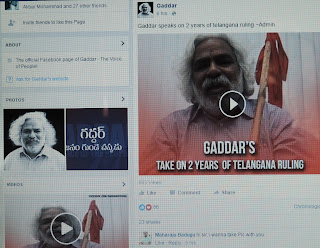Adivasis are worried over free regularization of Sada Bainama (land deals on plain papers) were done before June2, 2014 for which state government has given permission.
The Adivasis feel that the permission went against the Adivasis of scheduled areas in Adilabad district in particular and the state in general.
The Adivasis are of the opinion that the permission for registration of Sada Bainamas might be misused by the other groups among the Tribals and non- tribals.
However, they say that regularization of Sada Bainama land documents was against the 1/70 Act (Prevention of Land Transfer Act). The Adivasis suspected that revenue officials might have done regularization of Sada Bainama land records against the Adivasis keeping the innocent Adivasis in dark.
The Adidvais leaders say that there were many incidents where Tribal Lambadas and non- tribals encroached upon the lands of the Adivasis in the last 40 years and even made pattas to such land with the help of the revenue officials.
They give the recent example of getting patta to the nearly 2- acre land taken on the lease by one Jadhav Ramarao from Kolam Adivasis Sukmathrao in 2004 and got regularization of that land on his name without the knowledge of the actual land owner Sidam Sukmath Rao of Admiyan village in Narnoor mandal.
Ramarao of Khandorampur of Narnoor created fake documents for the lease and claimed that Sukmath Rao sold the land as he had taken a loan Rs 6,500 in 2004 from him long back. Sukmath Rao approached the revenue officials against issuing patta to the land in the name of the Jadhav Ramarao.
In this backdrop, Adivasis worried on regularization of Sada Bainama of land records and suspect incidents of misuse of the permission given by the state government.
The Adivasi leader said there was every chance of Lambadas who migrated to Telangana from bordering Maharashtra and settled here in Adilabad may get rights on lands belonged to Adivasis taking the advantage of regularization of Sada Binama land documents.
Already, the innocent primitive Kolam tribals had lost their land to others.The Adivasis say the regularization of Sada Bainama of land records goes in favor of Lambadas as revenue officials say that they were regularizing the Sada Bainama of land records only among the tribals.















